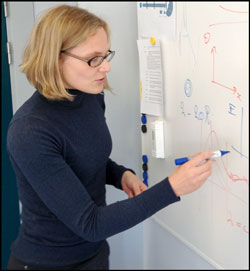Inaugural lecture by Pascale Deen
Uncovering magnetic correlations using neutrons and x-rays as probes

Abstract: Huge technological advances have been possible by better understanding and thus manipulating electronic properties of materials. Many advances have been made yet the behaviour of correlated spin structures, as found in emergent complex phenomena, cannot be predicted even though the interaction of individual electrons and lattices are fairly well understood. Collective behaviour drives these emergent phenomena and as such it is imperative to probe and perturb materials that display strong electron correlations.
X-rays and neutrons are ideal probes to investigate the microscopic electronic correlations of solids. The strength of scattering techniques lies in the ability to measure simultaneously spatial and time correlations, thus providing information on the different length and energy scales responsible for electronic phenomena. Such direct microscopic information makes neutron and x-ray scattering ideal to benchmark experimental results against theoretical models.
I shall give an overview of some of the unusual magnetic phenomena that I have had the pleasure to work. These scientific endeavours will be linked to the perspectives for neutron instrumentation at the ESS and collaborative x-ray scattering instrumentation needs.
About the speaker: Pascale Deen joined the European Spallation Source, Lund, Sweden, in 2011 as responsible for direct geometry instrumentation. Pascale received her Ph.D. in Condensed Matter Physics from the University of Liverpool, England in 2003 for the study of "Exchange coupling and superconductivity in light rare earth alloys and superlattices". She continued her work at the European Synchrotron Radiation Facility, Grenoble, France, as a Post-Doctoral researcher on the Resonant Magnetic X-ray Scattering beamline, ID20. On ID20 Pascale was able to develop a high pressure, low temperature facility for X-ray Magnetic Resonant Scattering and continue her experimental work in correlated magnetic behaviour. In 2007 Pascale accepted a post at the Institut Laue-Langevin, Grenoble, France, as an instrument scientist on the diffuse scattering spectrometer, D7, allowing her scientific profile to move towards frustrated magnetic order. Her post at the ESS will allow her to combine her scientific and instrumentation interests.
